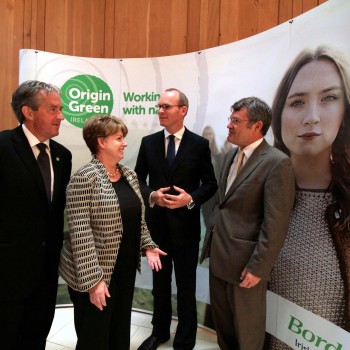Harvard academics examine Irish food industry

Ireland's "future has to be one where value is added before food is exported,” says Professor David Bell of Harvard Business School
18 September 2014
Over 120 leaders from the Irish food and drink industry and the Minister for Agriculture, Food and the Marine Simon Coveney gathered at the Michael Smurfit School of Business, Dublin today (Thursday 18 September) for Bord Bia’s fourth annual ‘Pathways for Growth’ seminar.
The Pathways for Growth initiative began in 2010 when Bord Bia engaged Professor David Bell and Mary Shelman of Harvard Business School to work with the Irish food industry to develop a vision for the sector’s future. Today’s event highlighted how this process has since helped to inform and guide some of the most significant developments in the Irish food and drink industry. Bell and Shelman also outlined an updated vision to reflect the current issues and opportunities facing the sector.
More to be done
Earlier this year in preparation for the seminar, the academics undertook 20 one-to-one interviews with key stakeholders and leaders from the industry to discuss what has been achieved and what remains to be done. “The CEOs we spoke with this year almost unanimously describe their companies as being better positioned than four years ago,” said Professor Bell.
“They are more cost competitive, have more professional management, show greater confidence and have higher ambitions, better understand what is needed to compete in global markets, devote more effort to talent recruitment and development, and put more emphasis on innovation. However, there are still fundamental issues of competitiveness and scale. While much has been achieved since 2010, most notably the success of Origin Green, it is clear if Ireland’s food industry is to achieve its potential, there is more to be done.”
Professor Bell added: “It should be apparent that a small country like Ireland should not be basing its economy on commodity products, which will always have low margins and high volatility. The future has to be one where value is added before food is exported.”
Origin Green target on track
One of the key recommendations of the initial ‘Pathways for Growth’ report was to develop a single brand for the Irish food industry. In June 2012, Bord Bia launched Origin Green, a sustainability programme and brand, which articulates Ireland’s ambition to become a world leader in sustainability. Origin Green works across the entire supply chain – from farms to manufacturing – and as such it is the world’s first national sustainability programme. At farm level, Bord Bia auditors measure energy, emissions, water, biodiversity, and some socio-economic data, meanwhile for manufacturers the Origin Green charter requires three levels at which targets, stretch targets are to be set: namely, raw material sourcing, manufacturing processes, and social sustainability.
Addressing the delegates Aidan Cotter, chief executive, Bord Bia said that the target set two years ago, to have every farm and food business in the country signed up to the sustainability agenda by 2016, was well on track.
Importance of health and wellness
During his presentation, Cotter encouraged the Irish food industry to prioritise health and wellness as part of its social sustainability commitments. “Health and wellness is unarguably the single biggest long term driver of change in the food industry and those who can leverage it effectively are those who will ultimately prevail in the marketplace,” he said.
He also launched Bord Bia’s new Origin Green promotional video featuring Irish actress Saoirse Ronan which can be viewed on www.origingreen.ie.
Origin Green in Numbers
- A total of 356 food and drink manufacturers, accounting for 85% of our exports, have signed up to Origin Green
- Some 228 are at workshop and plan development phase, 128 plans have been submitted and 70 companies, accounting for 70% of exports, have had their sustainability plans accepted and become full members
- Over 43,500 beef farms, accounting for 90% of Ireland’s beef production, are full members of Origin Green, audited and carbon-footprinted on an 18 month cycle
- Details of almost 18,000 dairy enterprises, accounting for virtually all dairy farms in the country, have been submitted to Bord Bia by 25 dairy cooperatives and they are in the course of undergoing their first audit cycle
- Bord Bia is currently carbon footprinting approximately 700 farms per week
- Last year, Bord Bia recruited 10 Ambassadors to help share the Origin Green story with global organisations. In June of this year the Ambassadors completed their first round of placements with leading global organisations including the World Wildlife Fund; Starbucks; Coca-Cola and Walmart



 Print
Print




Fans 0
Followers